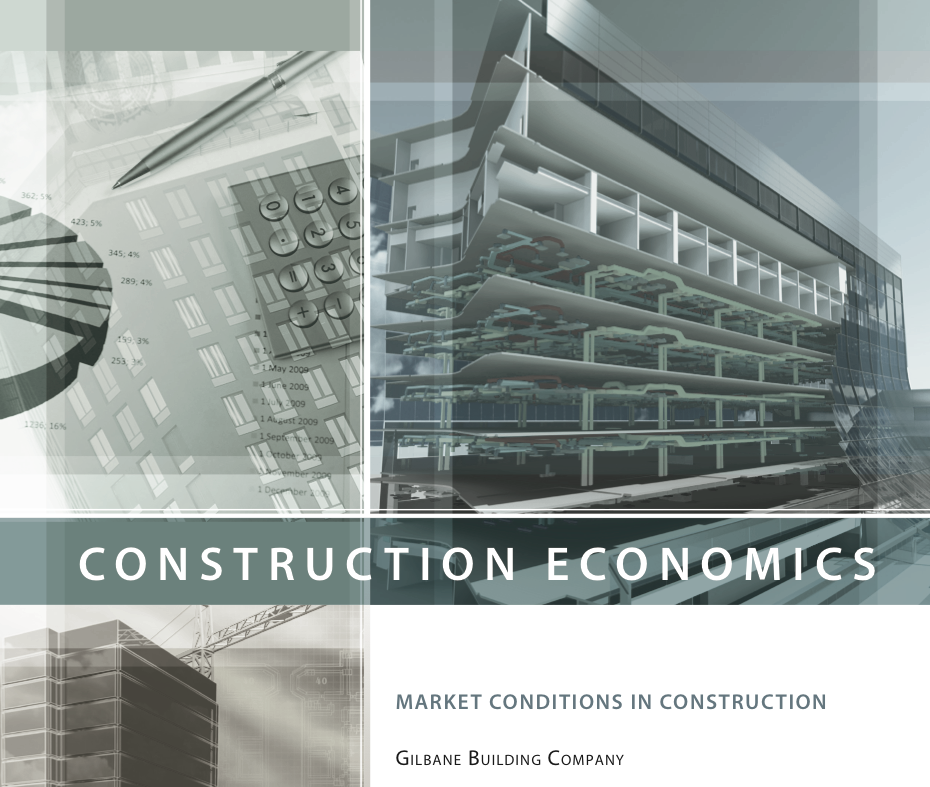The construction sector in the nine states with 50% of construction employment was up 169,000 jobs from February to September 2012, following a lost of 137,000 jobs from September 2011 to January 2012.
That’s one of the key findings of “Construction Economics: Market Conditions in Construction” (November 2012), by Gilbane Building Co., Providence, R.I. The construction management giant found several others reasons to report that construction growth was looking up:
- Construction spending for nonresidential buildings should be up 4.9% in 2012 over 2011, to $297 billion. Residential should be up 12% YOY, putting total building construction ahead 8% for the year.
- Construction starts are increasing at a slow but upward rate, while backlog duration is also increasing. As a result, contractors are feeling somewhat more comfortable passing along material cost increases.
- Overall construction spending for 2013 should be up another 4.9%, with residential building dollars up 11%.
- Top sectors: healthcare and education, accounting for 40% of nonresidential building spending.
The Gilbane report drops the other shoe with several negative findings. For one, publicly funded work will likely be down in 2013 due to the paucity of bond issues passed in the November election period: about $30 billion, compared to more than $60 billion in 2008.
Moreover, spending on public construction has declined 5% YOY and was expected to finish 2012 12% below the 2009 peak. The Gilbane report forecasts a further drop in public construction in 2013, for the fourth consecutive year.
And while there has been some recent hiring, the construction workforce has lost 2.25 million, or 29%, in recent years. “It will be many years before the entire workforce grows back to its previous level,” the Gilbane report says.
More info: info.gilbaneco.com/Portals/160261/docs/economicreportwinter2012.pdf. +
Related Stories
| Mar 2, 2011
How skyscrapers can save the city
Besides making cities more affordable and architecturally interesting, tall buildings are greener than sprawl, and they foster social capital and creativity. Yet some urban planners and preservationists seem to have a misplaced fear of heights that yields damaging restrictions on how tall a building can be. From New York to Paris to Mumbai, there’s a powerful case for building up, not out.
| Mar 1, 2011
Smart cities: getting greener and making money doing it
The Global Green Cities of the 21st Century conference in San Francisco is filled with mayors, architects, academics, consultants, and financial types all struggling to understand the process of building smarter, greener cities on a scale that's practically unimaginable—and make money doing it.
| Mar 1, 2011
How to make rentals more attractive as the American dream evolves, adapts
Roger K. Lewis, architect and professor emeritus of architecture at the University of Maryland, writes in the Washington Post about the rising market demand for rental housing and how Building Teams can make these properties a desirable choice for consumer, not just an economically prudent and necessary one.
| Mar 1, 2011
New survey shows shifts in hospital construction projects
America’s hospitals and health systems are focusing more on renovation or expansion than new construction, according to a new survey conducted by Health Facilities Management magazine and the American Society for Healthcare Engineering (ASHE). In fact, renovation or expansion accounted for 73% of construction projects at hospitals responding to the survey.
| Mar 1, 2011
AIA selects 6 communities for long-term sustainability program
The American Institute of Architects today announced it has selected 6 communities throughout the country to receive technical assistance under the Sustainable Design Assessment Team (SDAT) program in 2011. The communities selected are Shelburne, Vt., Apple Valley, Mn., Pikes Peak Region, Co., Southwest DeKalb County, Ga., Bastrop, Tx., and Santa Rosa, Ca. The SDAT program represents a significant institutional investment by the AIA in public service work to assist communities in developing policy frameworks and long term sustainability plans.
| Feb 24, 2011
Perkins+Will designs 100 LEED Certified buildings
Perkins+Will announced the Leadership in Energy and Environmental Design (LEED) certification of its 100th sustainable building, marking a key milestone for the firm and for the sustainable design industry. The Vancouver-based Dockside Green Phase Two Balance project marks the firm’s 100th LEED certified building and is tied for the highest scoring LEED building worldwide with its sister project, Dockside Green Phase One.
| Feb 24, 2011
New reports chart path to net-zero-energy commercial buildings
Two new reports from the Zero Energy Commercial Buildings Consortium (CBC) on achieving net-zero-energy use in commercial buildings say that high levels of energy efficiency are the first, largest, and most important step on the way to net-zero.
| Feb 24, 2011
Lending revives stalled projects
An influx of fresh capital into U.S. commercial real estate is bringing some long-stalled development projects back to life and launching new construction of apartments, office buildings and shopping centers, according to a Wall Street Journal article.
| Feb 23, 2011
London 2012: What Olympic Park looks like today
London 2012 released a series of aerial images that show progress at Olympic Park, including a completed roof on the stadium (where seats are already installed), tile work at the aquatic centre, and structural work complete on more than a quarter of residential projects at Olympic Village.
| Feb 23, 2011
Call for Entries: 2011 Building Team Awards, Deadline: March 25, 2011
The 14th Annual Building Team Awards recognizes newly built projects that exhibit architectural and construction excellence—and best exemplify the collaboration of the Building Team, including the owner, architect, engineer, and contractor.










